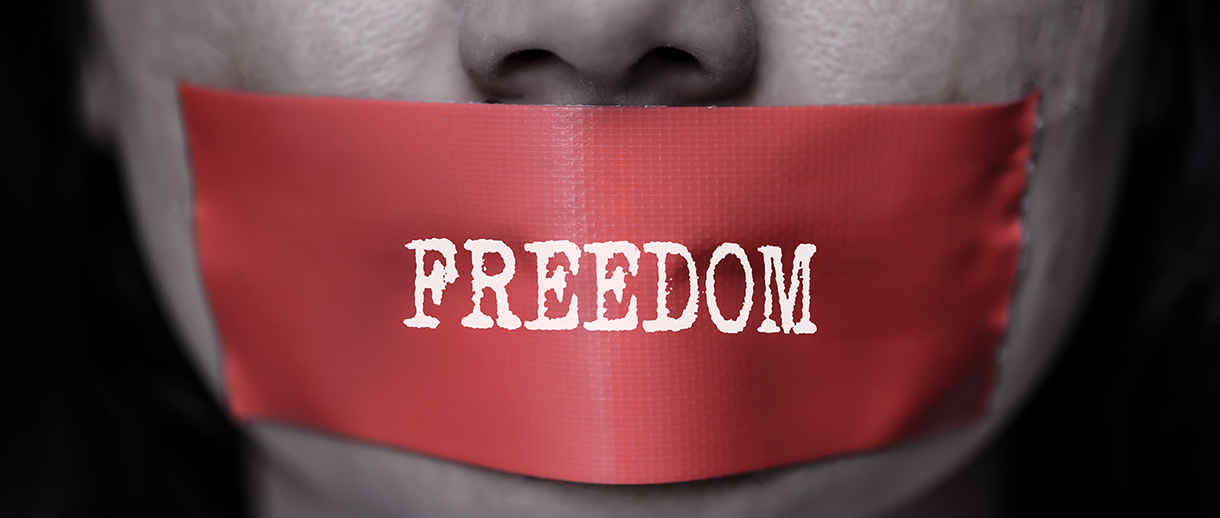
The law should not be used in a manner that has chilling effects on the ‘freedom of speech and expression’, observed the Supreme Court of India in S. Khushboo v. Kanniammal1. Based on the same rationale, a petition has been filed by journalists Kishorechandra Wangkemcha and Kanhaiya Lal Shukla (“Petitioners”), for challenging Section 124A of the Indian Penal Code, 1860 (“IPC”) which penalises the crime of ‘sedition’ (“Petition”).
The internet and social media have become vital communication tools through which individuals can exercise their right of freedom of speech and expression and exchange information and ideas. With the advent of social media, what is also being regularly observed is orders directing taking down of ‘sensitive’ content from social media platforms. In recent days, Twitter and Facebook have taken down or blocked political content that’s critical of the Indian government. In the recent past, many citizens have been booked under sedition for exercising their legitimate constitutional right to freedom of speech. For instance, in Jharkhand, 10,000 tribals were booked under sedition for protesting against the government for issuing an order allowing commercial use of tribal land. In another case, a single mother of an 11-year-old was charged with sedition after her daughter participated in a purportedly anti-CAA play in Bidar, Karnataka. One JNU student was charged with sedition for a speech he gave during an anti CAA protest. More than 50 people were booked for sedition in Mumbai for raising slogan in favour of the JNU student.
A similar situation befell the Petitioners who have been charged with sedition under Section 124A of the IPC in various FIRs for comments and cartoons shared by them on the social networking website, Facebook. The Petitioners have prayed that Section 124A be declared unconstitutional and void and be struck out of the IPC.
The main contention of the Petitioners is that Section 124A infringes upon the fundamental right of speech and expression, guaranteed under Article 19(1)(a) of the Constitution of India. The Petitioners also argued that the law has been frequently misused since 1962, when it was first introduced. And while abuse of a law in itself does not bear on the validity of that law, it does point to the vagueness and uncertainty of the provisions, they said.
Section 124A of the IPC reads as “Whoever, by words, either spoken or written, or by signs, or by visible representation, or otherwise, brings or attempts to bring into hatred or contempt, or excites or attempts to excite disaffection towards, the Government established by law in India, shall be punished with imprisonment for life, to which fine may be added, or with imprisonment which may extend to three years, to which fine may be added, or with fine.”
Sedition law, or Section 124A, was inserted into the IPC in 1870. The colonial law was derived from the British Sedition Act of 1661, described as an act for safety and preservation of his Majesties Person and Government against treasonable and seditious practices and attempts. Even as it continues its controversial existence in the Indian statute books, it was abolished in Great Britain in 2009.
The Petitioners submitted that the Supreme Court’s judgment in Kedar Nath Singh versus State of Bihar2 (1962), which upheld the validity of sedition, may require reconsideration. In the Kedar Nath judgment, the Supreme Court had held that Section 124A was constitutional since it imposed a reasonable restriction on Article 19(1)(a). The Court read down the section, holding that acts involving intention or tendency to create disorder, or disturbance of law and order, or incitement to violence would be made penal by Section 124A.
The Petitioners submitted that the Supreme Court in Kedar Nath’s case did not go far enough in reading down the section. Retaining ‘intention’ and ‘tendency’ as basis for criminal liability means that these inherently subjective terms can be used (and abused) to penalise those who have not caused any violence or public disorder.
The Petitioners also submitted that in 1962, there may have been a need to use Section 124A as a means to prevent the public violence and public disorder that fell short of waging war against the state. Section 124A, was, at the time a necessary tool in crime control, it added. But that is not the case in 2021. The Petitioners submitted that in view of the material changes, both legal and factual, ‘sedition’ now constitutes an unreasonable and unjustifiable restriction on Article 19(1)(a).
The Petition also pointed to India’s obligations under International Law, and said the country was bound by the International Covenant on Civil and Political Rights (“ICCPR). The ICCPR recognises the inherent dignity of each individual and undertakes to promote conditions within states to allow the enjoyment of civil and political rights. Article 19 of the ICCPR protects the freedom of expression as a right of all individuals in the world. Although this right is not absolute, and can be restricted, international law sets stringent standards which need to be met in order for States to validly restrict this right. ICCPR provides that in order for a restriction on freedom of expression to be permissible, the Government must discharge the onus of proving that the restriction is: (a) provided for by law, (b) necessary, and (c) in pursuit of one of the legitimate aims set forth in the Article (is for the respect of the rights or reputations of others, for the protection of national security or of public order, or of public health or morals). It is submission of the Petitioners that Section 124A as a restriction of freedom of expression falls short of these requirements in that it is neither ‘necessary’ nor sufficiently ‘provided by law’.
Based on the above submissions, six decades after upholding the constitutional validity of Section 124A of the IPC, the Apex Court has agreed to examine whether the verdict in Kedar Nath Singh needs to be revisited and whether the penal provision of ‘sedition’ has lost its relevance in the present conditions. The bench after a brief hearing agreed to examine the plea and issued notice to the Centre seeking its response. It posted the matter for consideration on July 12, 2021. What is even more intriguing is that the present decision has come in less than three months after the Supreme Court had dismissed a similar plea by three lawyers challenging the provision saying the petitioners had failed to show any specific cause of action that prompted them to file the petition under Article 32 of the Constitution. It will be interesting to see how this unfolds before the Apex Court, amid a backdrop of an increasing number of people being charged with sedition, the accused ranging from students to activists to journalists to political opponents.
1 (2010) 5 SCC 600
2 SCR 767: AIR 1962 SC 955: (1962) 2 Cri LJ 103
















